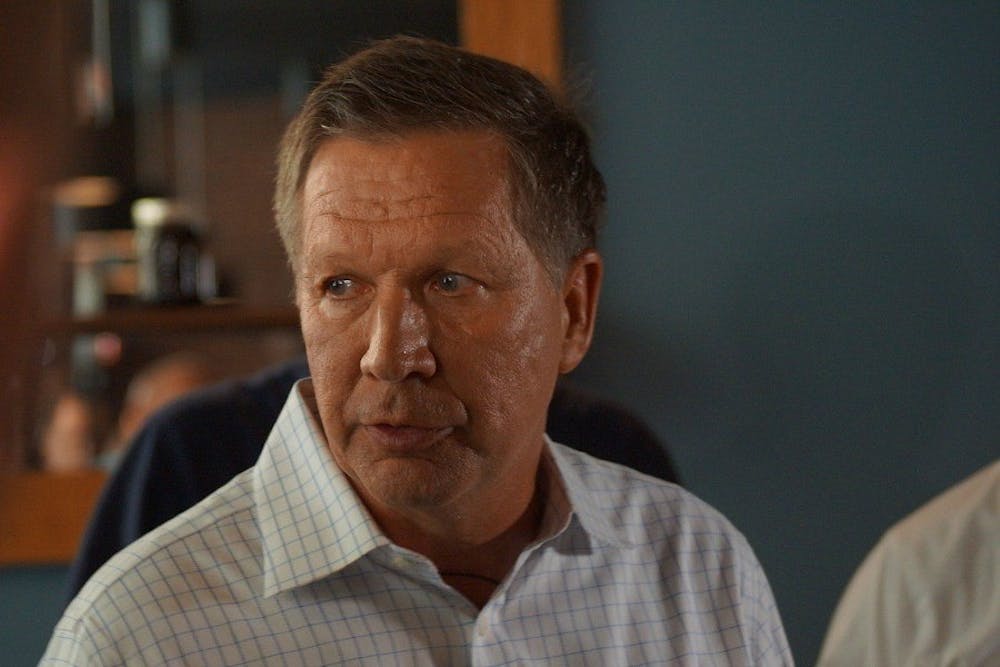By Elise Vasko, For The Miami Student
The Ohio primaries for the 2016 presidential election resulted in wins for Hillary Clinton and John Kasich.
Charles Kennick, Secretary for College Democrats, voted for Bernie Sanders and is disappointed with the outcome.
"I'm kind of concerned he's done. Personally, I don't know if he's going to have a chance," said Kennick. "I'm starting to realize in the general election I'll have to vote for Hillary Clinton and I'm not excited about that."
While he won't be happy about it, Kennick said he would vote Clinton over any republican in the field.
Ohio is the only state Kasich has won in the primaries so far. Although Kasich may not be a strong contender for the Republican Party nomination, his win in Ohio could still have an impact on Donald Trump's campaign, according to political science professor Ryan Barilleaux.
"Governor Kasich not only won the Ohio primary but he won it decisively," said Barilleaux.
According to Barilleaux, Kasich's win will be important because the delegates Kasich won are delegates Trump can no longer have and may help to deny him a first ballot nomination at the Republican convention.
"Beyond the delegate math, Kasich's victory represents symbolically that there are still a lot of Republicans who are unhappy with Trump," said Barilleaux.
Professor and Director of Black World Studies at Miami, Rodney Coates, said he believes Kasich's win represents a feeling of dissatisfaction with Trump on the part of many Republicans and a general anxiety regarding Trump's candidacy on the part of many Independent and Democrat voters.
"It demonstrated, hopefully, that Ohio is a little bit saner in that the mainstream Republican candidate won," said Coates. However, some disagree with this praise of Kasich's mainline ideals.
"It's scary because people think on a national stage that John Kasich is some type of moderate when he's just as hardline conservative as Ted Cruz and Marco Rubio," said Kennick.
Alex Cary, Treasurer for College Republicans, thinks Trump is the worst thing that could ever happen to the Republican party.
"I'm not a big fan of Kasich, but I'm very glad that he took Ohio," said Cary. "I will not vote for Trump, I will not support Trump, I would not vote in the general election."
Coates said Trump does not have the solidified support of the Republican Party, but that the party has not presented a strong candidate as an alternative.
"On the other hand, the Democrats have not brought a particularly strong candidate either," said Coates. "People are not particularly enamored with Bernie or Hillary but there are individuals who are willing to vote in order to keep Trump from the nomination."
Barrilleaux said he believes Trump's campaign has elicited such an extreme response from voters because he is willing to put an edge on all of his remarks that goes beyond what is considered normal for presidential candidates in the U.S.
"Donald Trump's campaign is mostly about attitude," said Barilleaux. "The attitude he projects is this kind of defiant, in-your-face kind of attitude. The response certainly shouldn't surprise people, because when you say things in a provocative way you'll get a provocative response."
Coates said most of Trump's support comes from the fringe elements of the Republican Party.
"The visceral response of individuals is that you have more individuals that are Independent and Democrat leaning than Republican leaning," said Coates.
Barrilleaux said Trump's candidacy has drawn more voters to the polls in the primaries.
"A lot of his success has come from drawing in votes from voters who are not necessarily traditional Republican voters," said Barilleaux. "When candidates are able to draw a larger constituency in the primaries it's, a lot of times, in places where they can bring in a lot of Independents."

